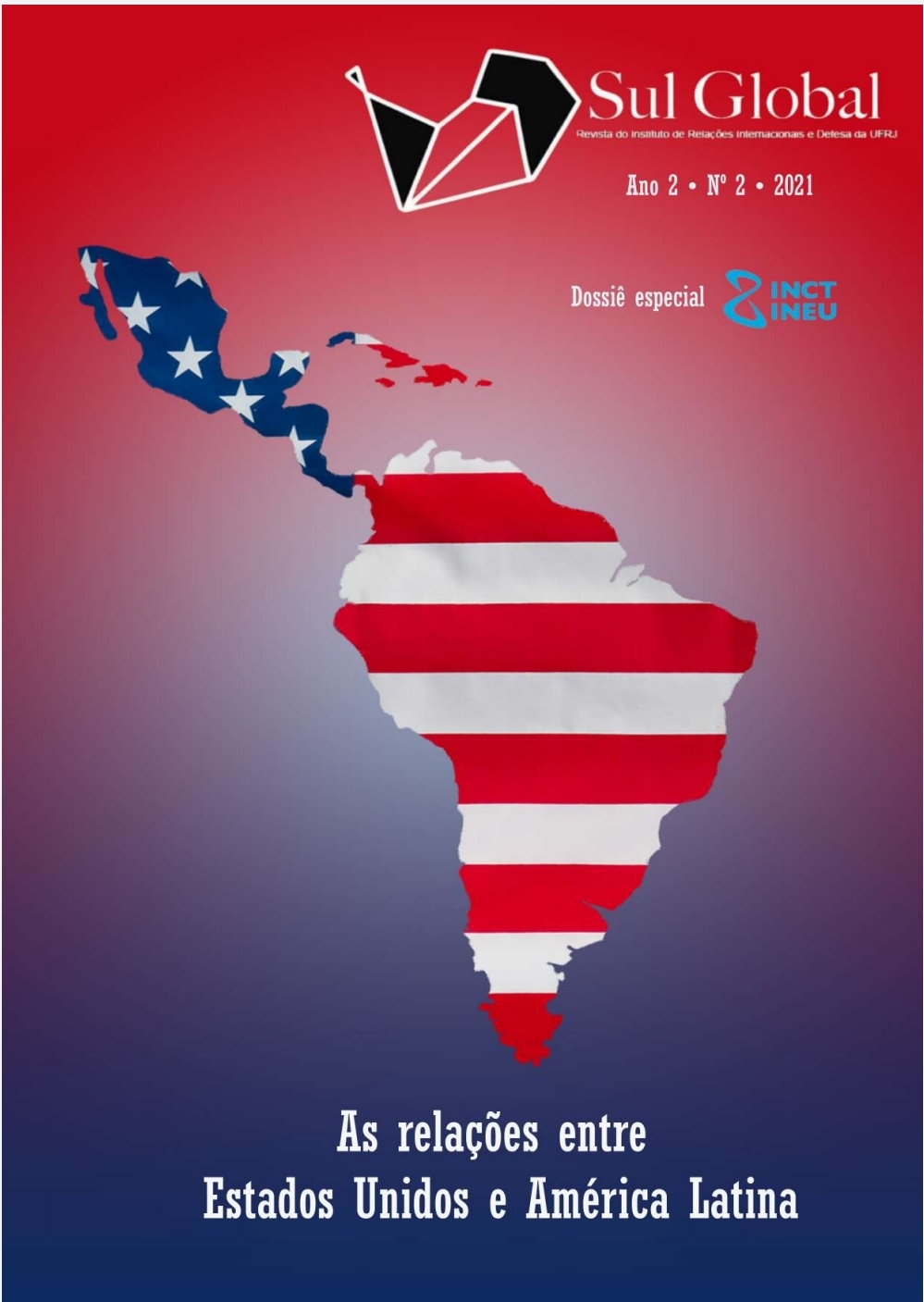Post hegemonic policies in South America : The case of financial cooperation
Palavras-chave:
Latin America, post-hegemonic strategies, multilateralism, United StatesResumo
This article proposes an analysis of the development of post-hegemonic strategies in Latin America during the last two decades. In the second section, we review the emergence of the strategy and its meaning in the light of multilateralism. In the next section, we analyse in detail the main initiatives in the financial sphere, perhaps one of the fields in which the region tried, with mixed success, to dispute the status quo.
Downloads
Referências
Acharya, Amitav (2014). Power shift or paradigm shift? China's rise and Asia's emerging security order, International Studies Quarterly, Volume 58, Issue 1, March 2014, Pages 158–173, https://doi.org/10.1111/isqu.12084
Acharya, Amitav (2017). After liberal hegemony: The advent of a multiplex world order. Ethics & International Affairs, 31(3), 271-285
Agostinis, Giovanni and Palestini, Stefano (2020) Transnational governance in motion: Regional development banks, power politics, and the rise and fall of South America's infrastructure integration. Governance. 2020; 1– 20. https://doi.org/10.1111/gove.12529
Battaglino, Jorge (2012) Defence in a Post-Hegemonic Regional Agenda: The
Benzi Daniel and Narea, Marco (2018), El regionalismo latinoamericano más allá de los «pos»: El fin de ciclo y los fantasmas globales, Nueva Sociedad, 275, 106-120
Briceño -Ruiz, Vigevani , Tullo and Pasquariello Mariano , Karina (2017), Post-hegemonic regionalism in Argentina, Brazil, and Venezuela, in José Briceño Ruı́z and Isidro Morales, ed Post-Hegemonic regionalism in the Americas: Toward a Pacific-Atlantic divide?, New York: Routledge.
Buzan, Barry. (2008). A leader without followers? The United States in world politics after Bush. International Politics, 45(5), 554–570
Battaglino, Jorge (2012),The Case of the South American Defence Council in Riggirozzi, Pı́a and Tussie, Diana, eds, The Rise of Post-Hegemonic Regionalism: The Case of Latin America. Dordrecht: Springer.81-100
Castiglioni, L. (2013). La nueva arquitectura financiera regional. Documento de Trabajo. Buenos Aires: Clacso, https://core.ac.uk/reader/35173260
Deciancio, Melisa (2016 ), El regionalismo latinoamericano en la agenda de la teoría de las Relaciones Internacionales, Iberoamericana, XVI (63), 91-110
Fawcett, Louise. 2005, ‘The Origins and Development of the Regional Idea in the Americas’ in Regionalism and Governance in the Americas: Continental Drift, eds. L. Fawcett & M. Serrano, Palgrave-Macmillan, London.
Fourie P. (2013) ‘Turning Dread into Capital: South Africa’s AIDS Diplomacy, Globalization and Health, vol.9, issue 8. Available from: http://www.globalizationandhealth.com/content/9/1/8, accessed 15 June 2015
Global Governance (2014) Special Section: Principles from the Periphery: The Neglected Southern Sources of Global Norms. 20 (3): 359–417.
Helleiner, E. (2017). The Latin American Origins of Bretton Woods. The global political economy of Raúl Prebisch, 78-94.
Herrero Maria Belen and Tussie Diana . UNASUR Health: A quiet revolution in health diplomacy in South America. Global Social Policy. 2015;15(3):261-277. doi:10.1177/1468018115599818
Humphrey, C. (2017a). He who pays the piper calls the tune: Credit rating agencies and multilateral development banks. The Review of International Organizations, 12(2), 281-306.
Keohane, Robert (2001). Governance in a Partially Globalized World "Presidential Address", "American Political Science Association, 2000". The American Political Science Review, 95(1), 1-13.
Legler, Thomas. 2013. Post-Hegemonic Regionalism and Sovereignty in Latin America: Optimists, Skeptics, and an Emerging Research Agenda. Contexto Internacional 35, 2: 325-352.
Lenz, Tobias and Marks, Gary. (2016). “Regional Institutional Design: Delegation and Pooling.” in Börzel, Tanja and Risse, Thomas, eds, Oxford Handbook of Comparative Regionalism. Oxford: Oxford University Press, pp. 513-537.
Malamud, Andres (2011), A Leader Without Followers? The Growing Divergence Between the Regional and Global Performance of Brazilian Foreign Policy. Latin American Politics and Society, 53: 1-24.
Malamud, Andres (2013) ‘Overlapping regionalism, no integration: Conceptual issues and the Latin American experiences’, EUI Working Paper, RSCAS 2013/20, Florence: European University Institute
Mitrany, David (1943), A Working Peace System, Royal Institute of International Affairs.
Molinari, A., & Patrucchi, L. (2020). El diseño institucional del Banco del Sur. H-industri@: Revista de historia de la industria, los servicios y las empresas en América Latina, (27), 27-53.
Nemiña Pablo (2018) . En búsqueda de una inserción financiera poshegemonica: La política financiera externa del Kirchnerismo, Semestre Economico, 21(47). p.147-173.
Pallotti, A. (2004), ‘SADC: A Development Community without a Development Policy?’, Review of African Political Economy, 31 (101), pp. 513–31
Petersen, M., & Schulz, C. (2018). Setting the Regional Agenda: A Critique of Posthegemonic Regionalism. Latin American Politics and Society, 60(1), 102-127. doi:10.1017/lap.2017.4
Quiliconi, Cintia (2013), ‘Modelos Competitivos de Integración en el Hemisferio Occidental: ¿Liderazgo Competitivo o Negación Mutua?’, Revista CIDOB d´Afers Internacionals, vol. 102, no. 103, pp. 147-168.
Riggirozzi, Pía (2015). Regionalism, Activism, and Rights: New Opportunities for Health Diplomacy in South America. Review of International Studies 41, 2: 407-428.
Riggirozzi, Pı́a and Diana Tussie (2012) The Rise of Post-Hegemonic Regionalism: The Case of Latin America. Dordrecht: Springer.
Riggirozzi, Pía and Diana Tussie. (2017). Rethinking Our Region in a Post-Hegemonic Moment. In Post-Hegemonic Regionalism in the Americas: Toward a Pacific-Atlantic Divide?, ed. José Briceño Ruı́z and Isidro Morales. New York: Routledge. 16-31.
Schoeman, M. (2002), ‘From SADCC to SADC and Beyond: The Politics of Economic Integration’, Working Paper, University of Pretoria. Available from: http://www.alternative-regionalisms.org/wp-content/uploads/2009/07/schoemar_fromsadcctosadc.pdf
Trucco, Pablo (2012), The Rise of Monetary Agreements in South America , in Riggirozzi, Pı́a and Tussie, Diana , edc The Rise of Post-Hegemonic Regionalism: The Case of Latin America. Dordrecht: Springer. pp 101-124.
Tussie, Diana (2009) Latin America: Contrasting Motivations for Regional Projects. Review of International Studies 35, S1: 169-188.
Walt, S. M. (1985). “Alliance formation and the balance of world power”. International security, 9(4), 3-43.


